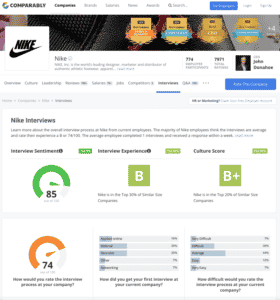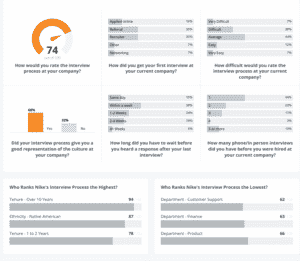Without question, we are in an unprecedented time when it comes to the pressure leaders face with recruiting top talent. The interview process can be time consuming and costly. Often, managers days are rushed from back-to-back Zoom meetings, and near impossible timelines. In our rush to find the talent we need, it’s easy to forget about the experiences we deliver that make a lasting impression on the many candidates we meet or review that don’t make the cut.
In the current labor landscape, a lack of focus on candidate experience can be disastrous for your employer brand. More than ever before, jobseekers are expecting that potential employers make them feel connected and inspired at each step. They expect far more than just a time-for-money exchange. Every candidate that applies to your job postings is evaluating you against competitors and determining how closely their experience aligns with the EVP you promote.
Today’s great reshuffling is due primarily to a desire for something more meaningful and personally aligned to their values. That means they are looking for that meaning during the job application and interview process. They are considering how your recruiters and managers behave and live your employer brand promise from the first interaction with your organization. In fact, most employers can see for themselves by looking at the commentary on Glassdoor, Indeed, and Comparably. On these sites job seekers publicly evaluate their experience and your brand, as a direct result of their candidate experience.


The experiences of candidates who aren’t good fits for the role are just as important. Some may become desirable candidates in the future after gaining additional experience or applying to a different role. Others may influence your employer brand and diversity equity and inclusion reputation in ways you cannot control. Word-of-mouth plays a larger role in the job-seeking process than it did before, and interviewees who feel disrespected or disappointed by the way an organization handles the interview process are frequently posting reviews online or even publicly shaming them in LinkedIn posts that turn viral.
So how can you make your interview process more humane and inclusive, while using it to boost your employer brand? These are a few of the key things to keep in mind:
Keep Your Employee Value Proposition in Mind
The interview process and the lead-up to it represents the first touchpoints many candidates will have with your brand. Make sure that your recruiters, hiring managers and leaders all have a clear playbook on what the EVP is at your organization, how the role itself will allow the individual to thrive and what impact your company is making on the world at large. When your teams have a clear and consistent message, your candidates will begin to trust that the company is true to its promise of a consistent and positive employee experience.
In addition to employer recruitment playbooks that highlight your EVP, consider providing recruiters and hiring managers with Talent Personas and key messaging that aligns to what each target persona values most.
Furthermore, provide hiring managers with an elevator pitch of not just the EVP, but the programs, development opportunities, perks, benefits, and wellness offerings of your company. Ensure they know what makes you different than your competitors, and what messages can help convert more job seekers to new hires.
Ensure managers and recruiters alike understand that each candidate, even those you pass on, have a powerful network of people that are potentially future employees or customers of your organization. Their word of mouth will be the story that is told about you as a potential employer so make sure it is the story you want shared about your employer brand.
Commit to Timely and Detailed Communication
We conduct research with hundreds of thousands of job seekers worldwide. Consistently they complain about tardy responses, and lack of insight on either the details of the job, or the candidate’s potential for the job.
Set clear commitments with candidates — and then meeting them as KPIs. This will help job seekers avoid frustrations and manage their expectations. This is especially important when it comes to hiring timelines. If an anticipated timeline changes due to a hiring freeze or vacation schedules, make sure to let candidates know.
Set clear communications needs and KPIs with hiring managers. This will help the recruitment team convey more detailed, honest, and open feedback. Even constructive feedback is welcomed. Talent simply wants to be respected for the time they are investing in your interview and screening process with two-way dialogue.
Consider too sending employer brand and culture videos, directing them to employer branded YouTube channels or podcasts to further introduce what makes your culture and experience special. Each touchpoint should be a moment to rebrand what makes your workplace an ideal place for them to land.
Set Candidates Up for Success
Any organization that’s serious about inclusivity needs to take a hard look at what unspoken rules may be giving an advantage to candidates who know how to decode them. Letting interviewees know what to wear, how to prepare, who they’ll be meeting and what to expect can help level the field.
Provide clear directions on what virtual platforms will be used if interviewing online and clarify interview location if in person. Setting them up for success will prevent no shows or late arrivals.
Provide links to hiring manager LinkedIn profiles, blogs, podcasts, etc. to help the candidate research and gain a background on the people that they are meeting.
Finally, give candidates at least 24 hours’ notice when scheduling interviews, especially those that are in-person; you don’t know what kind of transportation or family care issues they may have that could impede their performance.
At Blu Ivy we often provide clients with branded digital communications kits that can be shared with candidates at each step of the application, interview, feedback and offer stage. This kit enables more dynamic communications that are aligned to the message and experience that is your employer brand promise.
Treat Candidates as A Talent Network
Treat every candidate as if you’re building a long-term relationship with them. If they do not make the cut for the role, you are hiring today, they may be an ideal fit in future. In addition, they may be the most powerful referral contact you will make.
Ensure your recruiters stay in touch with talent, reconnect with valuable insights and invite them to participate in recruitment networking events or talent research panels. By thinking about candidates as one of the most powerful and lasting talent networks, by taking their experience into the design of your recruitment strategy, you will not only earn goodwill and convert more offers to acceptances, but you will also find that you yield tremendous leaps in your employer brand awareness and preference.
Blog Author:
Emily VanderHeyden
Senior Employer Brand and Culture Consultant
About Us
Blu Ivy Group is a global leader in employer branding, organizational culture, and recruitment marketing. We help organizations across the private, public, and not-for-profit sectors build extraordinary employee experiences, magnetic employer brands, and high-performance cultures.
From C-Suite to Employer Brand and Talent Acquisition leadership, we partner with our clients to transform their organizations and design the most compelling workplaces of the future.
For inquiries, please contact sparker@bluivygroup.com.






